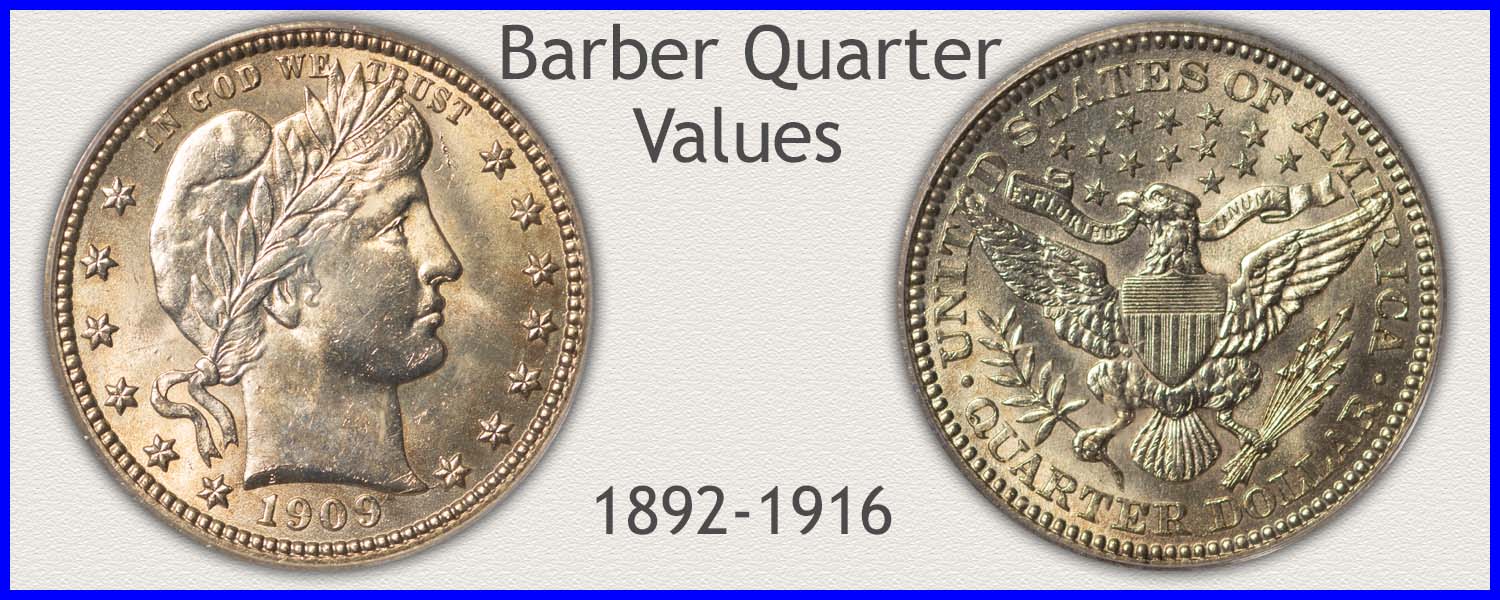Coin Values Moving with Precious Metals: Up-Dated 4/21/2025: Gold $3380 | Silver $32.89
1903 Quarter Value
Although silver price serves as a nice minimum for 1903 quarter value, collector quality examples are awarded a noticeable premium.
Most of these Barber quarters were in circulation for a long time and became very worn. Collectible condition is indicated if your coin displays details on Liberty's portrait. Continue to the "grading" section in Step 2 once you've completed this quick judgement of condition. The condition of the quarter, as well as its value, is narrowed with the help of images comparing different levels of preservation.
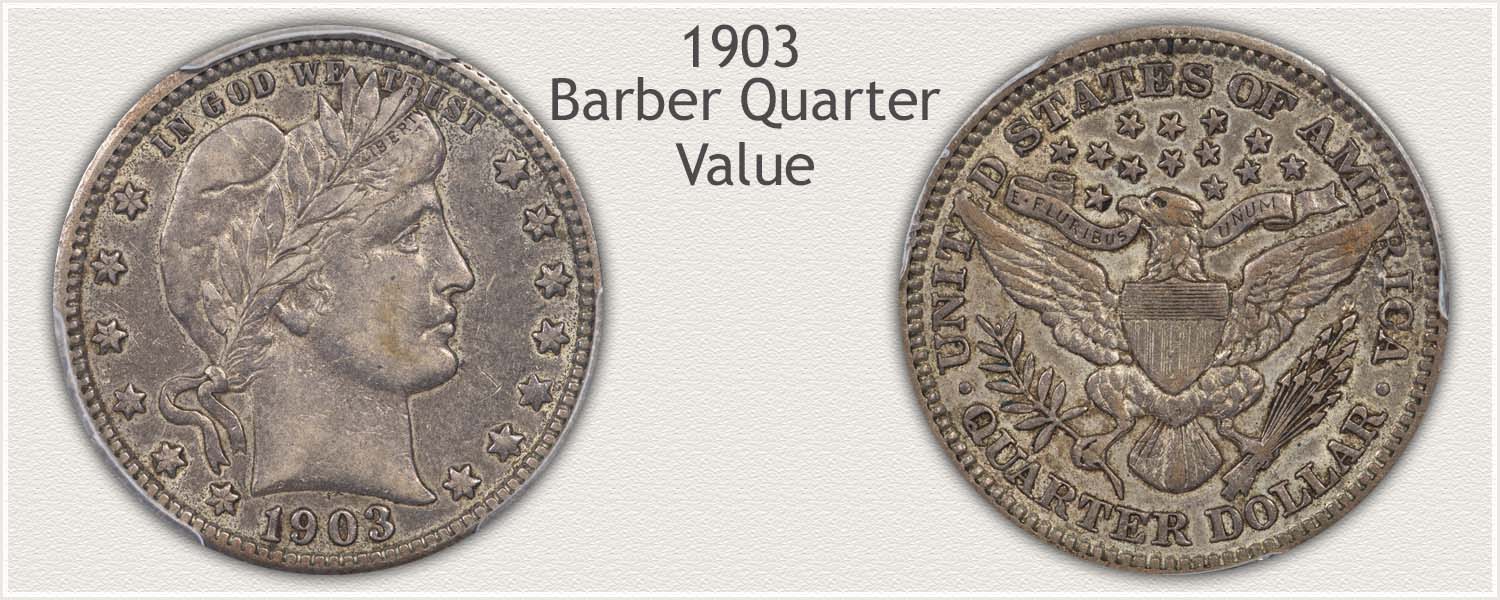
Steps Leading to Value:
- Step 1: Date and Mintmark Variety - There were three different mints that produced these 1903 quarters, and each is worth a different premium. Mintmarks identify the mint.
- Step 2: Grading Condition - The degree of wear and the coin's general appearance both have an impact on the coin's grade. A process of grading helps verify premium worth.
- Step 3: Special Qualities - Barber quarters in better-than-average quality are coveted by collectors. From high premium coins to affordable coins, proper storage maintains aesthetic qualities.
| 1903 Quarter Value | ||||
|---|---|---|---|---|
| Condition of Coin | ||||
| Date | Good | Fine | Extremely Fine | Mint State |
| Barber Quarter Values Updated | 4/21/2025 | |||
| 1903 | $7.94 | $19 | $60 | $195 |
| 1903 O | $9.14 | $43 | $167 | $450 |
| 1903 S | $14.11 | $46 | $139 | $571 |
Above are a starting point to determining a wholesale value of your Barber quarters. Follow the steps to narrow the range of subtle grading points.
Step 1: | Confirm Date and Mint Combination
Three Date and Mint Combinations of 1903 Quarters
Producing the most 1903 quarters was again the main mint in Philadelphia. Of the three mint varieties produced this year, Philadelphia's issue is the one likely found. Coinage was also produced by two more Branch mints, though in significantly smaller numbers.
Because of a range of values shown on the chart for both condition and mint varieties, a thorough examination is required of your coin. Images are used in confirming the important mintmarks.
1903-S Barber Quarter
"S" Mintmark on Reverse: San Francisco Mint Struck the Coin
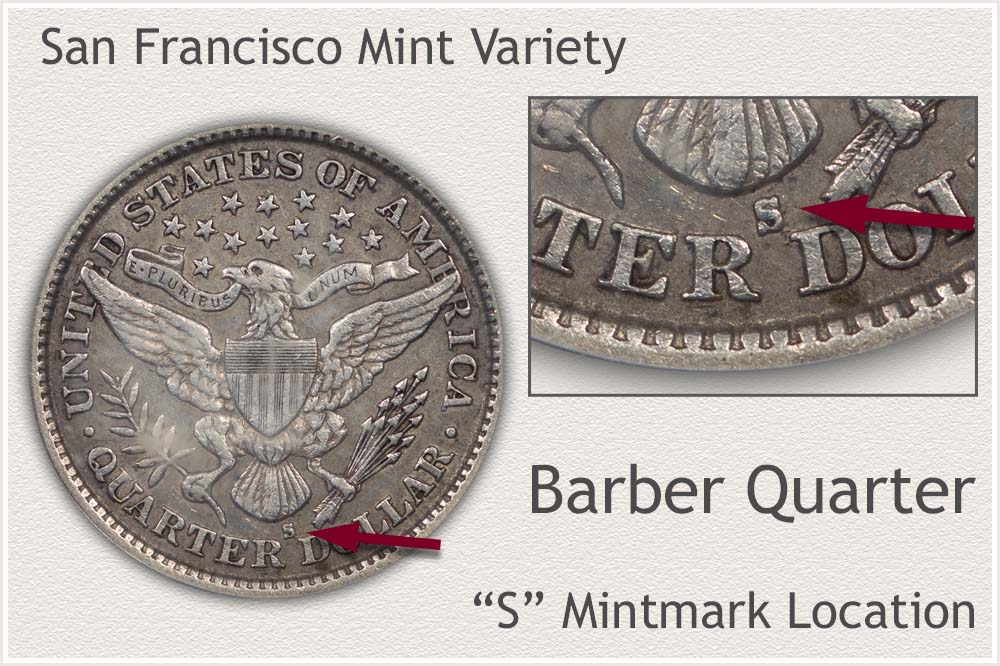
A 1903 San Francisco quarter represents a scarce mint issue of the Barber series. Over the course of the series, the mint in San Francisco routinely minted the fewest number of quarters compared to the other mints. 1,366,000 quarters were placed into circulation in 1903.
After confirming the mint variety, judging condition becomes the important part in finding a coin in the high value range.
San Francisco placed an "S" mintmark on all of its production of Barber quarter. On the reverse, the area above "Quarter Dollar" and just below the eagle's tail feathers contains the large "S" mark.
1903-O Barber Quarter
"O" Mintmark on Reverse: New Orleans Mint Struck the Coin
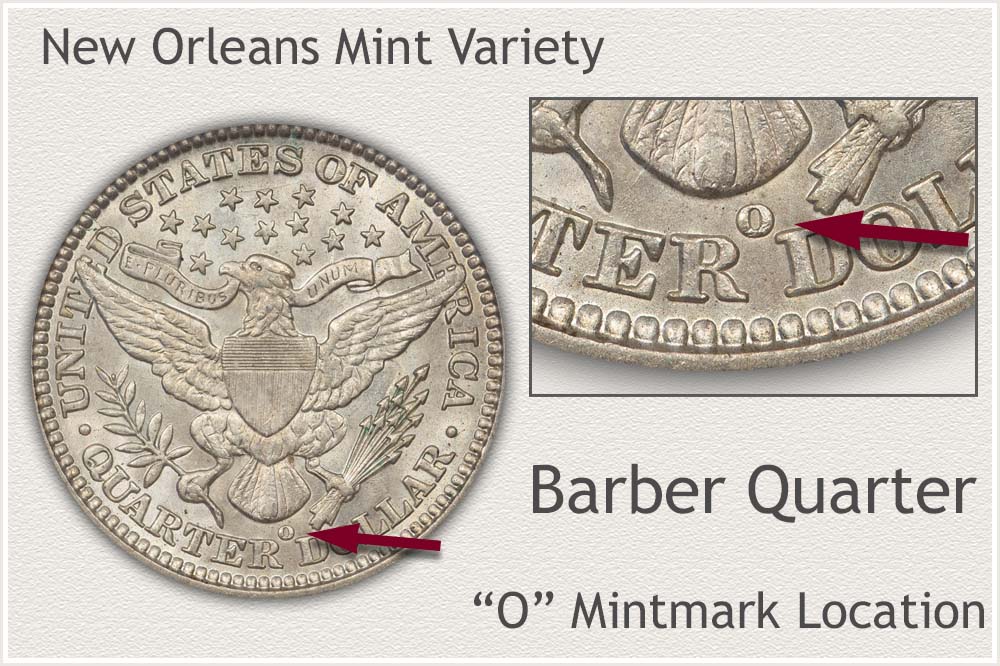
A great number of 1903 New Orleans quarters on the market today are heavily worn. Because of silver content, quantities trade with values tied to the per ounce silver worth. In the year, New Orleans struck 3,500,000 Barber quarters, the majority of these saw use in commerce for many years. There are ample quantities of coins that range from poor to low quality.
A key step to identify premium value is recognizing the "O" mintmark and then evaluating condition. Collectors of Barber quarters and specialists of the New Orleans mint's issues are aware that above average grade coins are hard to locate. This high-quality collector coin carries a premium because of its scarcity and eye appeal.
Look closely at the area directly below the eagle's tail feathers on the coin's reverse. On all of its coinage, New Orleans used the "O" mintmark. An "O" mark confirms the New Orleans issue of the example coin.
1903 Barber Quarter
No Mintmark on Reverse: Philadelphia Mint Struck the Coin
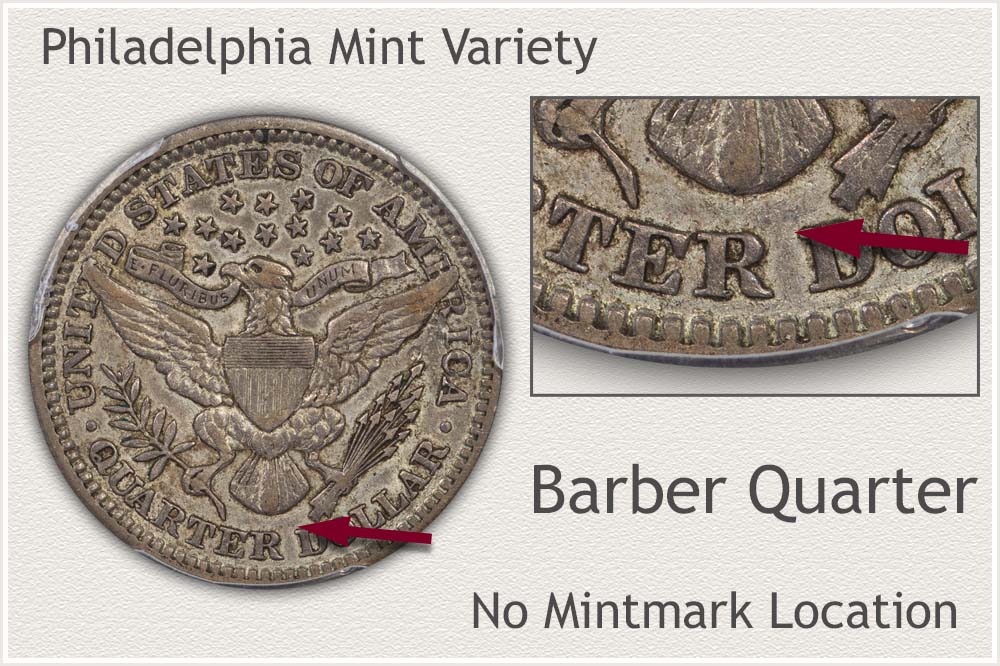
Philadelphia quarters of 1903 represent the likely variety encountered. With a strong mintage total of over 9.6 million produced these are considered the common mint issue of the year.
Popularity of the Barber series helps support collector premiums of the nicer condition coins. The very worn examples, considered common, are priced close to their silver content worth.
All Barber quarters are identified by both date and mint of issue. Mintmarks were used by the branch U.S. mints, however, Philadelphia, the main mint, did not place a mark on its coinage. On the reverse of the coin, above the "R" and "D" of Quarter Dollar, a blank space confirms the Philadelphia variety.
Step 2: | Grading Condition is Visualized Using Images
1903 Quarter Value is Judged and Defined by Condition
Rising values on the chart show that the condition of a coin is important to its appeal and premiums in the collecting market. Through the use of a grading system, condition of these coins is compared to images representing grades. Different conditions are defined by grades.
Look for a similar image to match your coin. Using the descriptions to focus on major features assessing stages of wear and confirming the grade.
Mint State Grade
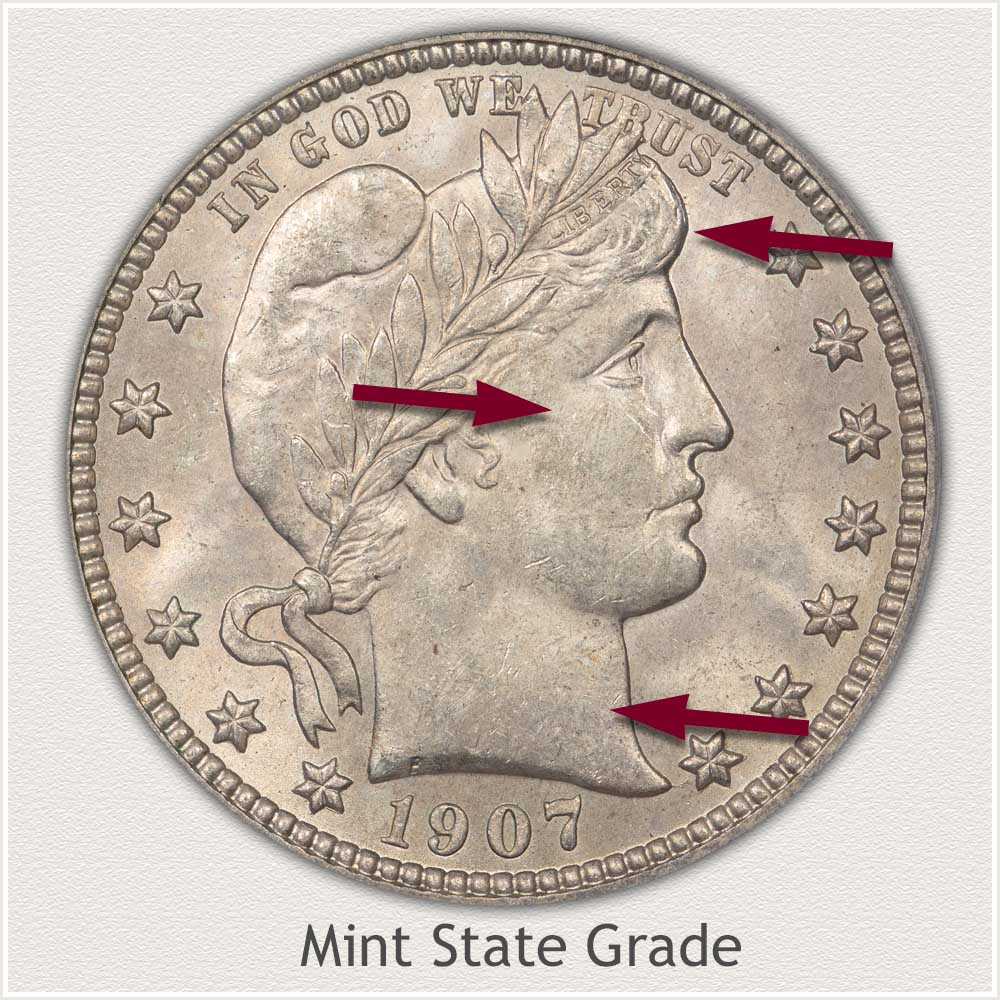
Mint State: A Mint State grade example is a highlight of a Barber quarter collection. Since it was initially produced, the surface of this coin has not seen any wear. An important step in recognizing this high quality is inspecting certain key areas of the design to ensure the original surface has not been worn away.
First, examine Liberty's entire cheek and neck area. During the coin's initial striking, the metal acquires a "luster." As an indication, when silver is worn, its luster becomes dull and soft gray in color. In Mint State condition, both high and low relief parts of the coin exhibit full luster when tilted and moved slightly under a light.
Now, the design's highest points are examined for signs of wear. There is no evidence of smoothing or flattening of the metal in Liberty's hair just above the brow. Individual hair strands in this area quickly merge together to form a flat, smooth surface if worn. A Mint State quarter is a highly collectible coin with complete detailing.
Extremely Fine Grade
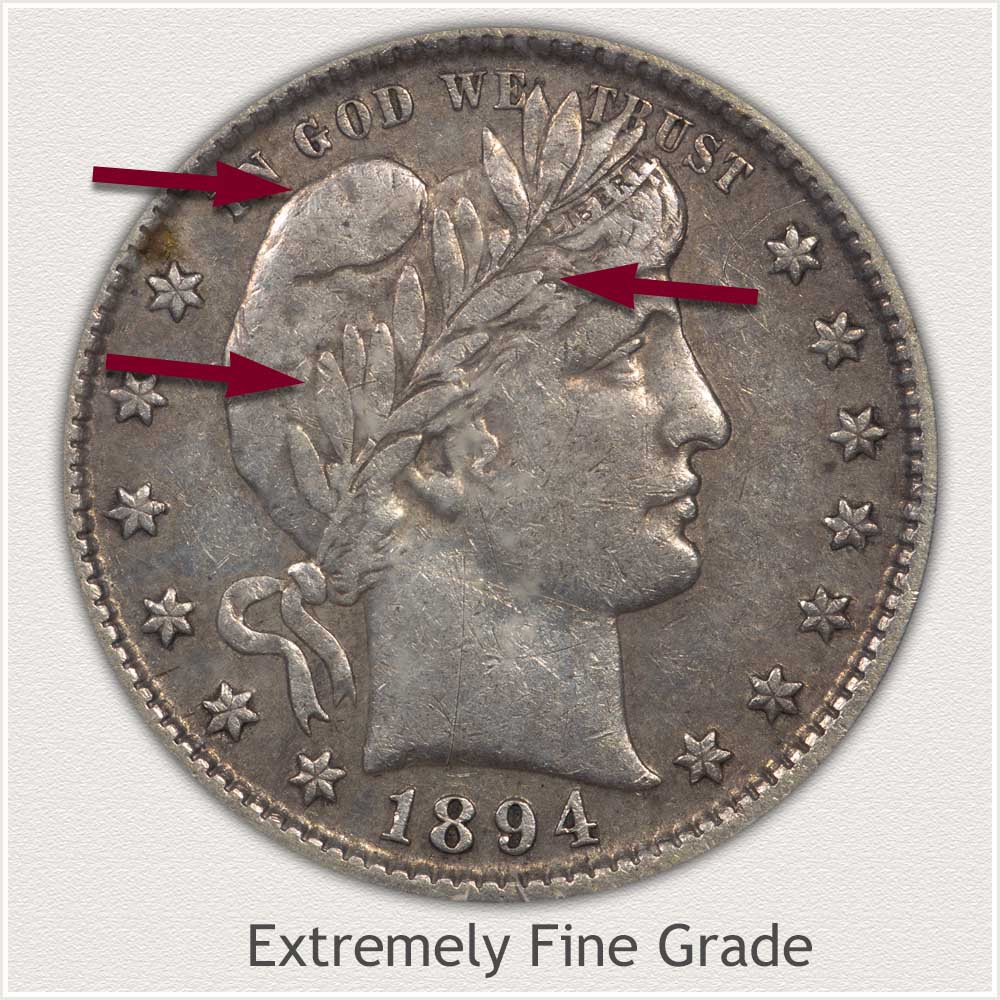
Extremely Fine: Surface condition of these old quarters is carefully examined by a collector. Wear is limited to the very top of high relief regions, and fine features remain visible to consider the coin as Extremely Fine grade.
One of the key areas to inspect is the wreath on Liberty's head. Throughout the leaves of the wreath are small, wear-prone details; slight contours and edges defining the leaves are examined. When examined closely, all of the Laurel leaf edges, including the stems, are strong and bold, indicating Extremely Fine grade quality. The lower row of leaves is also examined for these small details.
Additionally, folds of Liberty's cap at the top of her head are clearly defined, and detailed. Along the upper edge of the cap is the only indication of wear. In the example Barber quarter, Liberty's eye, nose, cheek, and neck are full and rounded, creating a bold portrait. These characteristics help identify coins of collector quality.
Fine Grade
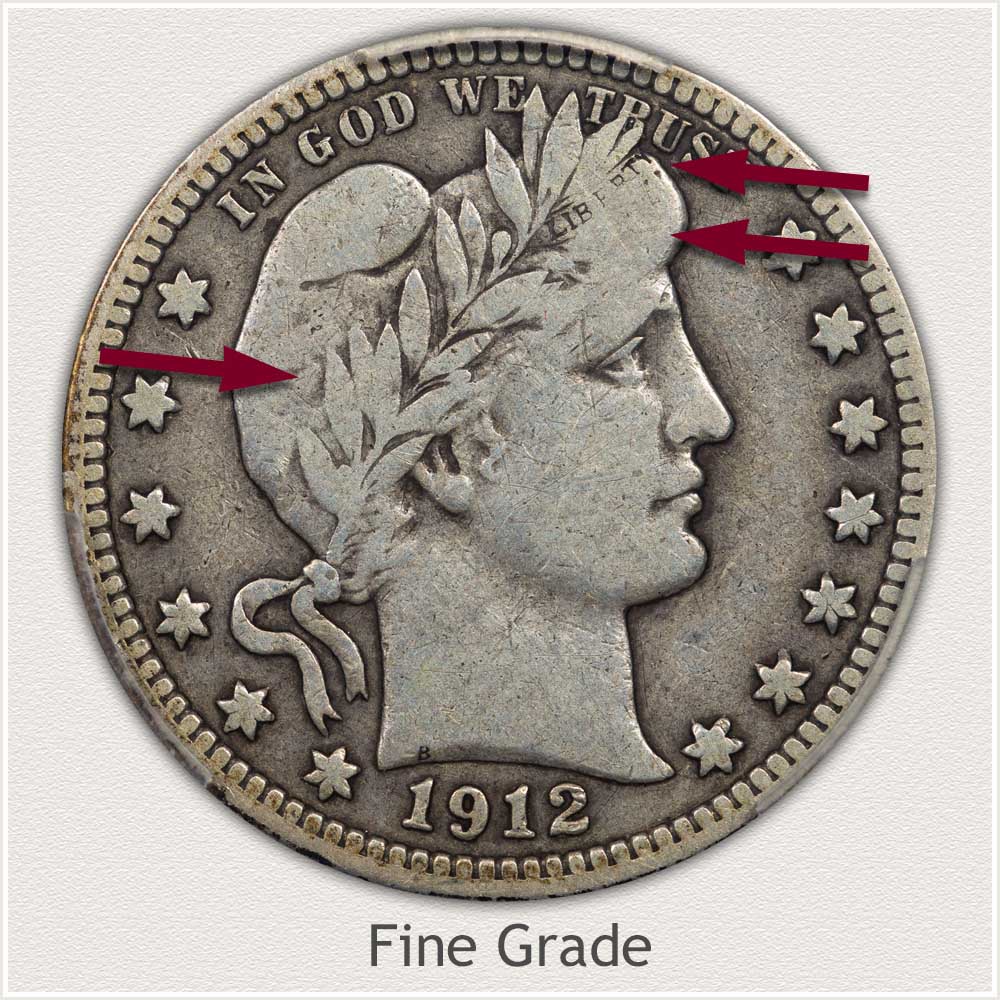
Fine Grade: A Barber quarter that is graded in Fine condition is a coin of collectible quality. It is necessary to examine several key design elements closely to identify any remaining details. A Fine grade quarter is characterized by general moderate wear.
High points of the design, when a coin circulates, become smooth and the depth of these details are worn away. One particular high point on the coin is Liberty's hair above her forehead. Helping identify the Fine grade, the hair has lost the details of its fine strands. Additionally, the headband's lower edge is missing and merged with her hair.
Condition of the individual leaves in the wreath is also taken into account when determining the final grade. Original contours within each leaf is now worn down to a level, smooth surface. Inner details of the leaves are missing. Visible edges and outlines to the upper row of leaves is important for maintaining the grade. Most leaves are still boldly represented, with the exception of a few small overlapped areas that are slightly blended.
A substantial amount of design detail remains, giving the overall impression of quality.
Good Grade
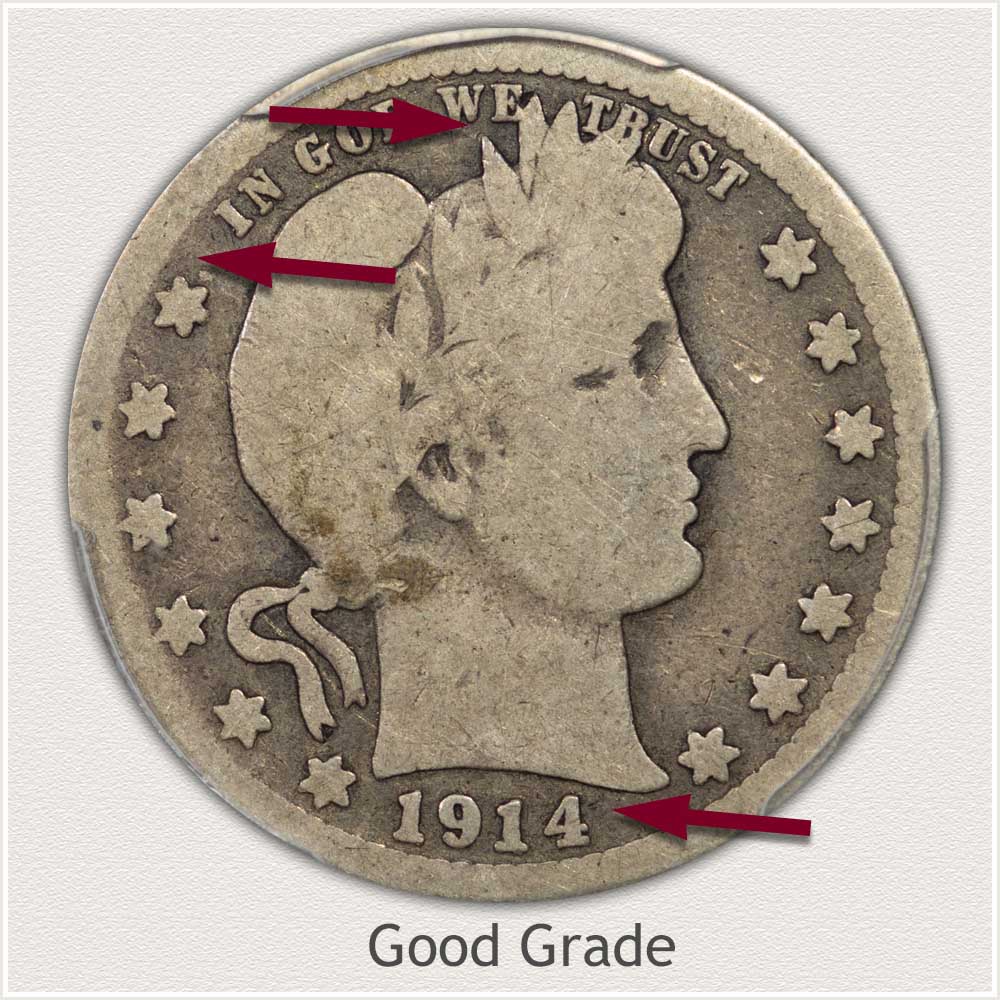
Good Grade: One of the nice features of the Barber quarter series is the original design is bold in its relation to the fields of the design. The portrait, even when heavily worn, remains complete and fully outlined. Defining the Good grade is the completeness of the portrait, rim, and date.
Note the date is full with no blending of the numerals with the rim. Following the rim along the entire coin there is no break or fading into any of the stars. Each star is complete in itself and separate from the rim.
The amount of metal removed because of circulation has lost the fine detail once part of Liberty's portrait. However, traces of the wreath are visible, and importantly, the top leaves above the forehead are complete in their outline. Remaining design is bold, giving the coin a quality appearance. Many new collectors find these an affordable and appealing collectible.
How to Video: Grading Barber Quarters
This video highlights additional features important to each of the various grades. Separate one grade from the next by identifying the condition of your quarter.
Video, Images and Descriptions | Grading Barber Quarters
Step 3: | Special Qualities | Proper Housing to Preserve Quality
Barber Quarters and Proper Storage
With advanced age of Barber quarters comes a need to safely preserve their surface qualities. Silver U.S. coinage of the time was a 90% silver to 10% copper alloy, prone to toning. Toning develops in the presence of air and, over long periods of time, darkens to a deep grey. When not protected, overly dark colors begin to hide details and lower aesthetic appeal.
Handling old coins is also a cause of deterioration. Delicate natural toning and surface qualities are easily disturbed when handled. Hold all Barber quarters by the edges to minimize contact with surfaces.
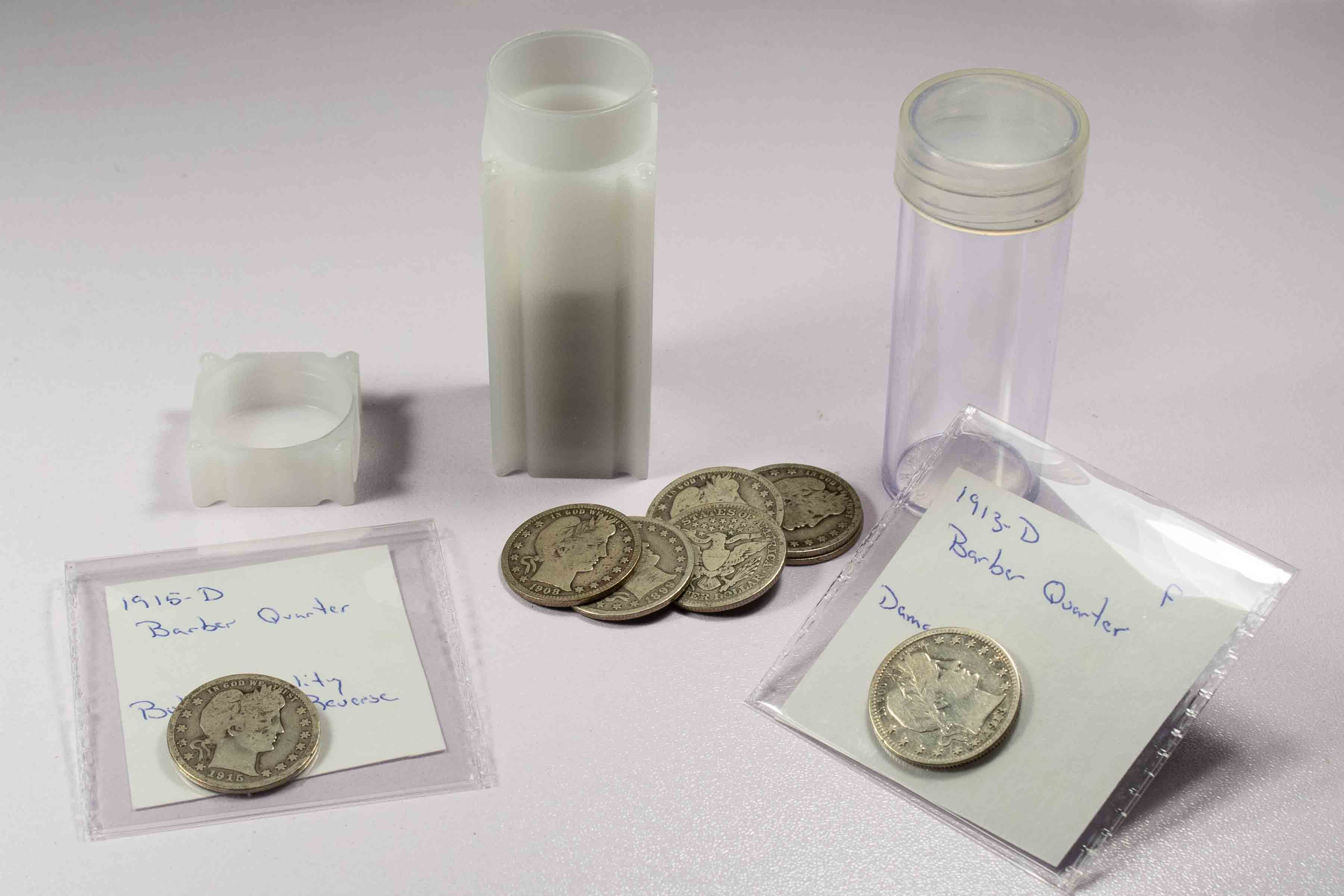
Specialty products are available to collectors intended to display and house collections. Additionally, individual holders "coin flips" termed by collectors, house single coins effectively. A second item are coin tubes to store bullion quality groups of quarters.
Imaged are nice Barber quarters in the Saflip brand single coin holders. A holder made of Mylar, a material that does not react with coinage alloys. An excellent choice to place most early era Barber quarters. Allowing a view of the coin without handling the surface.
Bullion quality quarters are well stored and organized in coin tubes. Handling is kept to a minimum and surfaces are protected.
These two items, Saflips and coin tubes, are a personal choice and sourced from WizardCoinSupply.com. Both are chosen for their high quality.
References
U.S. Mint. 1904 U.S. Mint Annual Report
https://nnp.wustl.edu/library/book/512059
U.S. Mint. Catalogue of Coins of the United States.
https://nnp.wustl.edu/library/book/554591
Coin Values | CoinStudy Articles
Date by Date
In Depth Barber Quarter Values
1892 to 1916
Barber Quarter Value | Many In Demand Dates
Different condition coins are valued separately, also the many dates and mints of the Barber quarters range from common to scarce to very rare. Complete value chart of all dates and mints with condition ranges are listed. All dates of the series are in demand.
Mobile guide identifies U.S. coinage using images and lists minimum values for each series. Links are followed to in depth coverage of all date and mint combinations and judging condition of coins.
Silver Coin Values | Minimum Values of U.S. Silver Coins
Heavily worn and abundant dates of Barber quarters are worth a base silver value. These old quarters are an alloy of 90% silver and minimum values move daily with the price of silver. Images identify all U.S. silver coin issues and the calculator determines current worth.
Selling Coins | Receiving Value
Barber quarters are part of a large coin market. Selling these, or any U.S. coin, follows a few steps to assure a current market value. Accurate identity of series, date and condition are recorded, all narrow the value range. Refer to the listing of dealers finding one specializing in coins similar to yours.
★Coin Values Discovery finds 1903 Quarter Value and...
All old U.S. coin values. The home page introduces the important steps in the value process. Identifying your coin series, accurate date and mint, and images to compare when judging condition. Key elements are noted to narrow a range of how much these old coins are worth.
